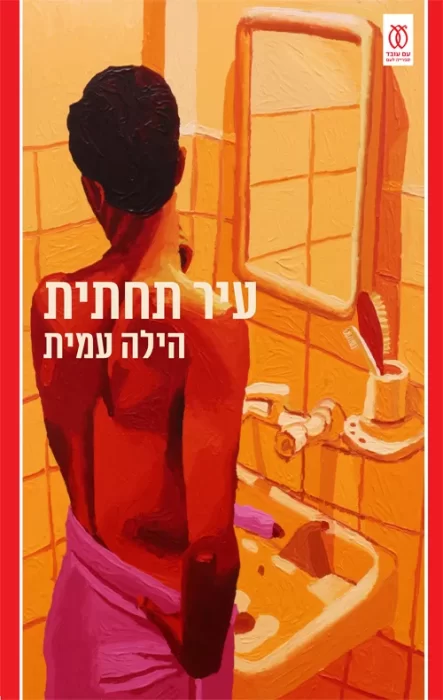For English review, please scroll down.
בספר הביכורים שלה, עסקה הילה עמית בסיפורים קצרים ביחסים בין יהודים וערבים ומיניות חריגה. ברומן העלילתי הראשון שלה חוזרת הילה עמית לעסוק בדמויות מהשוליים החברתיים, ביחסים בין ערבים ליהודים וביחסים מיניים חריגים בתוך חברה שמרנית.
"אליעד עמד ליד האוטו עם סכין יפנית ביד וחרט בפח. המתכת של האוטו הייתה קשה, חמה; השמש סנוורה אותו. הוא לא ידע אפילו מה השעה. הוא ידע רק שהתעורר לתוך הזוועה הזאת ושעכשיו הוא צריך לתקן אותה ככל יכולתו. את האות ה"א הוא סגר לריבוע, מתח את הקווים. הוא התרכז, העביר את הסכין מלמעלה למטה, מחק את הווי"ו, את המ"ם, את הווי"ו השנייה, אבל צד אחד לא הספיק, היה צריך להעביר גם קווים באלכסון…"
אליעד, ישראלי יהודי, הומו שבעל כורחו הוצא מהארון בצורה הכי שפלה שקיימת. על רקע הגילוי של מיניותו, הוריו מתנכרים לו והוא עובר לתל אביב, רק בכדי לשקוע לתוך טישטוש חושים ויאוש. אם הוא לא עובד כמוקדן, הוא מעשן גראס וישן על מזרון בחדרו הקטן והמצחין בדירת שותפים. אליעד לא רק סובל מניתוק ממשפחתו הוא גם נקלע לחובות כלכליים וחייו מתגלגלים מדחי לדחי.
ואז, לילה אחד הוא פוגש באיברהים, בן למשפחה חיפאית אמידה המתגורר בחיפה שהגיע לגיחה לתל אביב. איברהים הוא הומו המודע למיניותו אבל בשל החברה השמרנית שבה הוא חיי, הוא מחפש את הסיפוקים שלו בתל אביב.
הרגש בין אליעד ואיברהים פורח. שניהם חריגים במידה מסויימת ומוצאים נחמה בחריגות המשותפת שלהם, כמו גם אהבה. אליעד מעיז לחלום, על בית, משפחה, זוגיות.
עד שהבועה הזו מתנפצת, כאשר איברהים מחליט להינשא לחברת ילדותו מריים, ערבייה לסבית שגדלה במשפחה דיספונקציונלית, עם אב אלים והפכה לעובדת סוציאלית במעונות לנשים וילדים בסיכום. מריים מגלה את המיניות שלה בגיל מאוחר והיא מרגישה שהעבודה אינה מספקת אותה יותר היא צריכה ילד.
הספר נע בין הסיפורים של אליעד, איברהים ומריים. בין עבר להווה, בין חלום למציאות עגומה ומדכדכת.
היה לי קשה מאוד עם התכנים, עם הדמויות, עם החיים שהסופרת בראה לדמויות שלה. חיים של חוסר אושר וסבל. אבל הוא כתוב בכישרון, באמפטיה, בחמלה ובכאב עמוק על אילוציי החיים של הדמויות. מצאתי שאני נשאבת לתוך הייסורים והבדידות של אליעד, לתוך הפחד של מריים ולתוך העמדת הפנים של איברהים שבסופו של דבר גם הוא דמות מאוד בודדה.
הסופרת גם מציבה לנו, כחברה ישראלית מראה מזעזעת על יחסנו לערבים שהם "מסריחים" או "מחבלים" למרות הם אזרחי ישראל. הסצנה בנתב"ג פשוט הממה אותי.
מומלץ בחום. ספר שמאוד קשה לשכוח.
עיר תחתית/ הילה עמית
עם עובד, 2022, 221 עמודים
דירוג SIVI –
איכות אודיו –

In her first book, Hila Amit wrote short stories about Jews and Arabs and unique kinds of sexuality. In her new novel, she continues to write about people not often talked about, exploring the relationships between Arabs and Jews and different sexual identities in a traditional society.
Eliad is from Israel and is gay. After his private life was poorly exposed, his family turned away from him. Feeling lost, he moved to Tel Aviv. There, his life is challenging: he has a simple job, spends a lot of time doing nothing other than smoking, and lives with roommates in a tiny room. He's sad because he's not close to his family anymore and is struggling with money, which makes his life very uncertain.
One night, he meets Ibrahim, a wealthy Haifa family member. Ibrahim is gay, and he is aware of his sexuality. However, due to the conservative society in which he lives, he seeks his satisfaction in Tel Aviv. Ibrahim came for a trip to Tel Aviv, where they met.
The relationship between Eliad and Ibrahim blossoms as they find solace in their shared abnormality and love. Eliad dares to dream of a future together, including a house, a family, and a loving relationship.
Ibrahim plans to marry his long-time friend, Maryam. Maryam, who likes women, had a tough childhood and now helps women and children for a living. But she wants more from life now, especially to have a child.
The book tells the stories of Eliad, Ibrahim, and Maryam, weaving between past and present, dream and reality.
I found the book's content challenging, as it portrayed the characters' lives as full of unhappiness and suffering. However, the author wrote with great talent, empathy, compassion, and a deep understanding of the life constraints that the characters faced. I was particularly moved by the anguish and loneliness of Eliad, the fear of Maryam, and the pretense of Ibrahim, who ultimately revealed himself to be a very lonely character as well.
The writer shows us how, in Israel, there's a harsh way that some people think of Arabs, calling them bad names or seeing them as dangerous, even when they are Israeli citizens. There was a part about the Israeli national airport that shocked me.
I strongly recommend this book. It's very memorable.
לגלות עוד מהאתר Sivi's Books
Subscribe to get the latest posts sent to your email.

